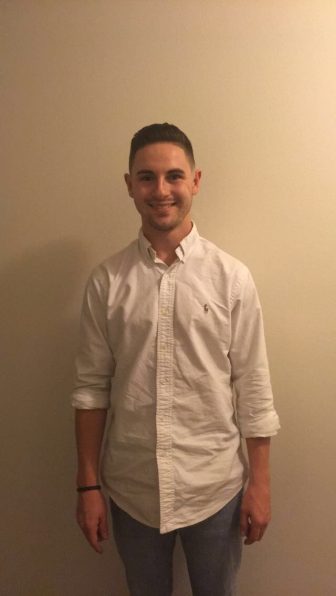Growing up in the South, 23-year-old Doug Dufrin developed a skepticism to the government that has sustained itself over time.

Jacob Vogel
Doug Dufrin at his apartment in East Lansing, Mich. on Sept. 18, 2018.
“I can remember when I was still down South and they took the Pledge of Allegiance out of schools,” said Dufrin, an East Lansing stock trader who was born in Alabama and has lived in New Orleans and California. “ I stopped caring what the government was doing in a sense because they are going to do whatever they want anyway.”
That skepticism has held Dufrin back from registering to vote. He questions the power his individual vote holds on results.
“I really don’t know if [voting] really does anything,” Dufrin said. “It’s not like I don’t believe in the country’s morals or the right to vote, but I just don’t believe that’s how it actually works anymore.”
Hacking is an issue that has added to Dufrin’s reluctance to voting as well. He is concerned because elections and other major US databases have been hacked before.
Despite not being registered and being critical about the power of a vote, there are still issues in the U.S. that Dufrin would like to see change.
The two major issues Dufrin has are with the health industry and the process of nominating and electing correct candidates. He said “the pharmaceutical industry is one, in the sense of what it does to the body and how many politicians hold shares in pharmaceutical companies.” He also said the country’s standards for food quality are too low.
He also believes that politicians aren’t “truly” elected anymore. “In the sense of who’s in office, I think they’ve bought their way there,” he said.
Dufrin said if he were registered he might vote in presidential elections and the legalization of marijuana, but nothing apart from that at this point. Legalizing marijuana is a proposal on the ballot in Michigan Nov. 6.
“Education and ignorance” are the two major reasons Dufrin believes youth voting turnout is typically low.
“I think people are choosing to be ignorant to what’s going on, because the real situation is that if they thought about it, it would stress a lot of people out,” he said. “So, I think people are choosing to ignore as a kind of fight or flight mode.”
Lack of education on the registration and voting process is an issue that Dufrin has experienced as well. Even though he doesn’t feel as informed, he believes he has a good perspective on how it’s done and what goes on through a family member.
“My stepdad was in the military, so I kind of got the flip-side of how a few things go on,” he said. “He still votes and is adamant about it, but just from personal experience I just kind of formulate my own opinion.”
In terms of youth voting, Dufrin encourages it, and believes the most effective method to increasing the turnout is through apps.
“Apps to vote, apps for registration and only allow one Social Security number per vote,” he said. “I think if they get that, they would get way more people to participate.”
Dufrin will remain hesitant to vote until he sees more change within the system. He compared what he’s doing to a “strike,” but he does not want the majority of people to adopt that mindset, so that the United States avoids a “dictatorship.”